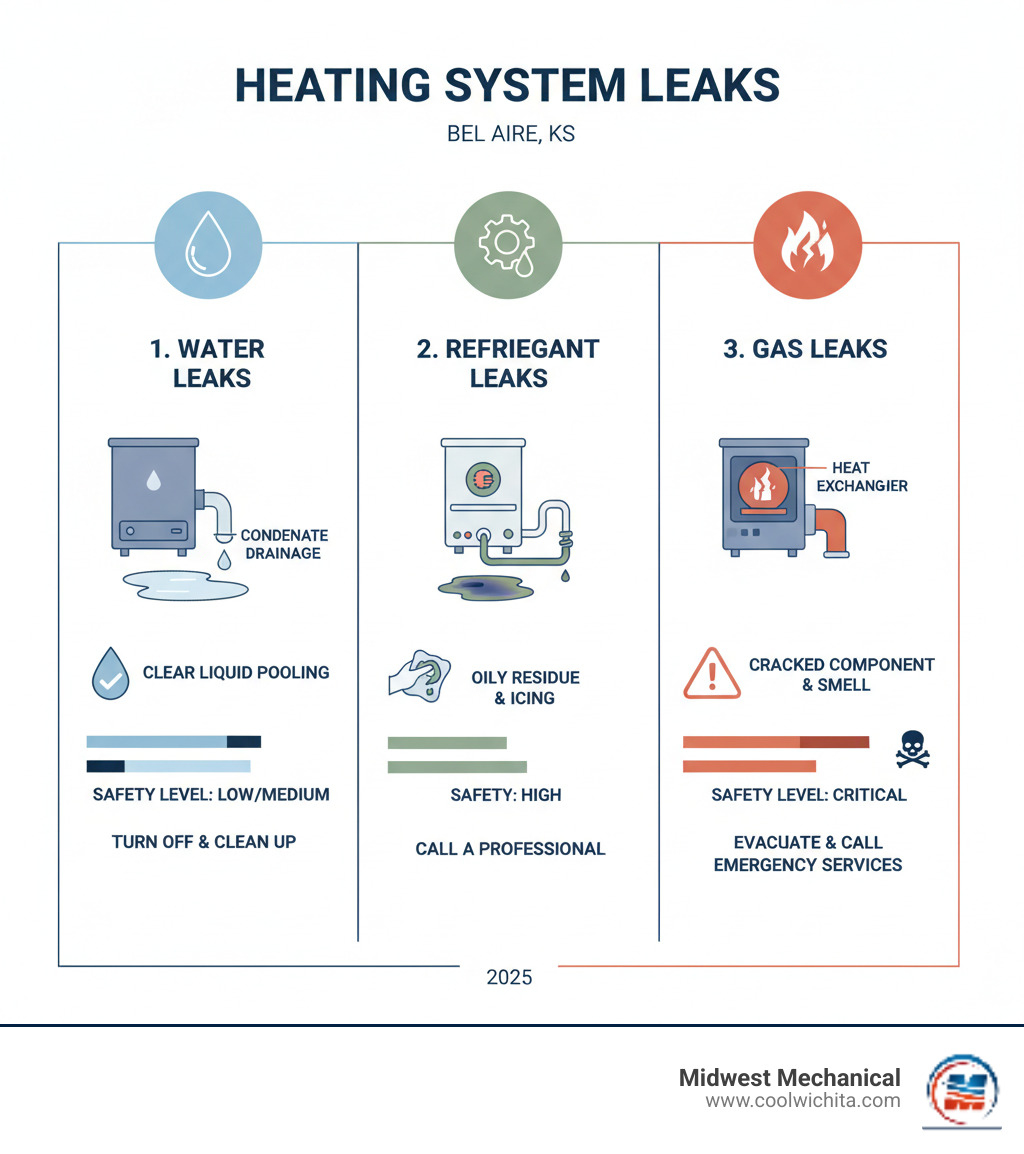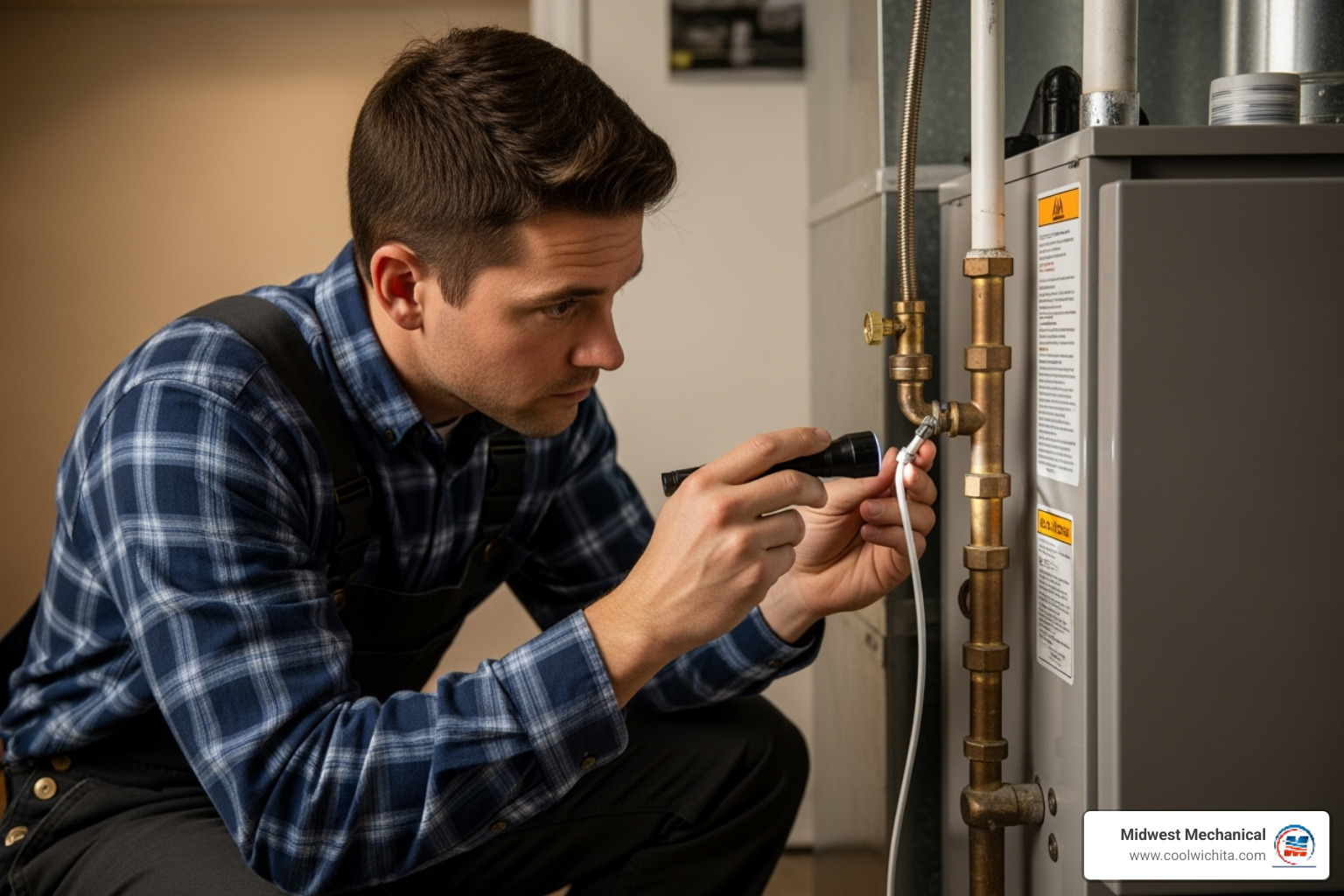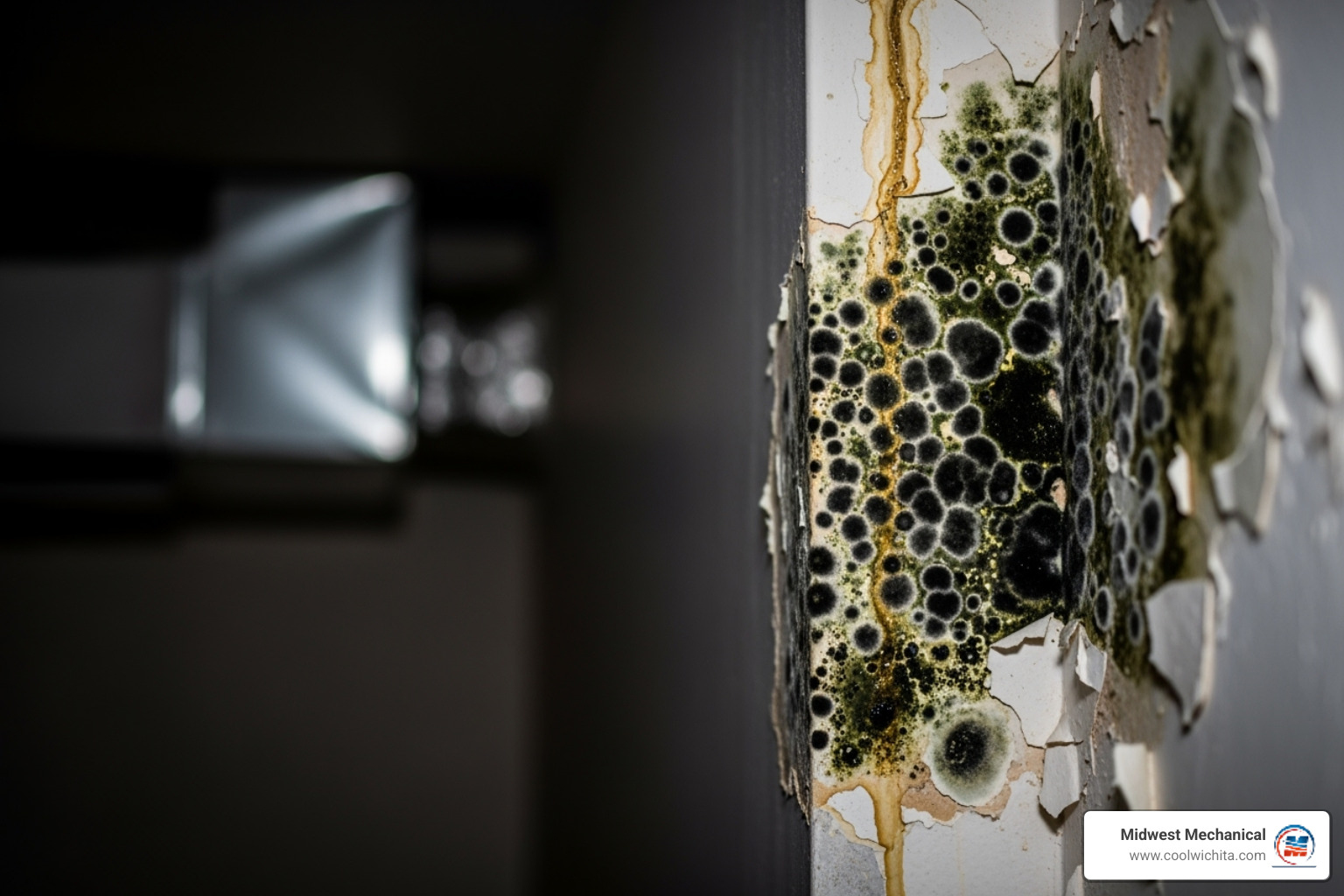Why a Reliable Heating System is Critical for Bel Aire Homeowners
If you're dealing with heating leaking in bel aire ks, you need to act fast. Here are the immediate steps to take:
Quick Action Steps for a Heating Leak:
- Turn off your heating system immediately to prevent further damage.
- Look for the source by checking for water puddles, rust, or damp spots near your furnace or boiler.
- Identify the type of leak: Is it water (condensation), refrigerant (oily residue), or gas (rotten egg smell)?
- Call a professional, especially for gas leaks. Do not attempt major repairs yourself.
- Document the damage by taking photos for your records.
Kansas winters don't mess around. When temperatures drop, your heating system is vital. Finding a puddle of water near your furnace is more than an inconvenience; it's a warning sign. Leaks can manifest as water from a condensate line, refrigerant from a heat pump, or gas from a cracked heat exchanger. Understanding the type of leak helps you take the right action quickly. Ignoring issues like duct leaks can cause your system to work harder and increase energy bills by 30 to 40 percent. Water stains, hissing sounds, or frequent cycling are all red flags that demand attention.

Recognizing the Red Flags: Common Signs of a Heating Leak
Your heating system usually gives warning signs before a major failure. Spotting them early can save you from expensive damage. Here are the key red flags to watch for when you suspect heating leaking in bel aire ks:
- Puddles or Standing Water: The most obvious clue. Any water near your furnace, boiler, or heat pump is a problem, not just normal condensation.
- Unusual Noises: Hissing could signal a pressurized water leak or a dangerous gas leak. Bubbling may indicate air in the system or a refrigerant issue.
- Musty Odors: A damp, moldy smell from your vents means water is accumulating somewhere, promoting mold growth and harming your indoor air quality.
- Higher Utility Bills: Leaks force your system to work overtime, which can increase your energy costs by 30 to 40 percent.
- Visible Damage: Look for rust or corrosion on the unit, pipes, or fittings. On walls and floors, check for water stains, peeling paint, or warped materials.

- System Malfunctions: A furnace that starts short-cycling (turning on and off frequently) is struggling. If your furnace is blowing cold air, it could be a serious issue like a cracked heat exchanger. For boilers, a drop in system pressure indicates a water leak. A pilot light that won't stay lit or burns yellow instead of blue is a major safety concern.
For more details, see our guide on Signs your heating system needs repair.
Differentiating Between Water, Refrigerant, and Gas Leaks
Knowing the type of leak helps you respond safely.
- Water Leaks: The most common type, appearing as clear water pooling near your unit. They usually stem from a clogged condensate line, cracked drain pan, or a connected humidifier. While not immediately dangerous, they cause structural damage and mold.
- Refrigerant Leaks: Found in heat pumps, these leaks leave an oily residue around coils or connections. You'll also notice a significant drop in heating performance.
- Gas Leaks: The most dangerous. If you smell the distinctive rotten egg odor of natural gas or hear a persistent hiss without visible water, act immediately. Evacuate the building, then call your gas company or 911 from a safe location. Do not use phones or light switches indoors.
If you're unsure about the type of leak, professional Leak detection Bel Aire service is the safest choice to pinpoint the source.
Common Causes of Heating Leaking in Bel Aire KS
Understanding why heating systems leak can help with prevention. Here are some of the most common culprits our technicians see.

Furnace and Boiler Leak Sources
- Clogged Condensate Drain: High-efficiency furnaces produce acidic condensate that must drain away. If the drain line gets blocked by debris, water backs up and overflows.
- Cracked Heat Exchanger: This critical component separates combustion gases from your breathing air. A crack can leak deadly carbon monoxide and requires immediate professional inspection.
- Corrosion and Age: Over time, metal components like pipes, tanks, seals, and gaskets can corrode or wear out, leading to leaks. This is a common issue in older boilers and furnaces. You can learn more about how to Prevent pipe corrosion in Bel Aire.
- Pressure Issues: In boilers, a faulty pressure relief valve can leak. Excessively high water pressure can also strain pipes and connections, causing them to fail.
- Damaged or Loose Parts: Vibrations can loosen connections over time, while drain pans can crack or rust, allowing condensation to escape.
For more information, check our guide on Common furnace repair issues.
Heat Pump Leak Issues
Heat pumps can leak both refrigerant and water.
- Refrigerant Line Leaks: Vibration or corrosion can cause tiny cracks in the copper refrigerant lines. This reduces heating efficiency and often leaves an oily residue.
- Frozen Coils and Clogged Filters: A dirty air filter restricts airflow, causing coils to freeze. When the ice melts, the drain pan can't handle the excess water, leading to an overflow. If your heat pump is making strange noises, it could be related to this issue; our guide to Fix your noisy AC in Bel Aire quickly has relevant tips.
- Duct Leakage: While not a fluid leak from the unit itself, leaky ductwork is a major source of inefficiency. According to ASHRAE, many homes lose 10-25% of their conditioned air through duct leaks, forcing the system to work harder and increasing energy bills.
The Risks of Ignoring a Leak and How to Prevent Them
A heating leak never fixes itself and ignoring it leads to bigger problems. Here are the primary risks for Bel Aire homeowners:
- Structural Water Damage: Even a small drip can saturate drywall, ruin flooring, and compromise your home's structure over time.
- Mold and Poor Air Quality: Dampness creates a breeding ground for mold and mildew, which can trigger allergies and respiratory issues.
- Complete System Failure: Leaks cause corrosion and strain that can lead to a total system breakdown, often during the coldest part of winter.
- Safety Hazards: A cracked heat exchanger can release carbon monoxide, a silent killer. Gas leaks can cause explosions, and water leaks near wiring can create fire hazards. These are serious risks detailed in our guide on when an HVAC system needs repair.

Immediate Steps for Homeowners
If you find a leak, act quickly:
- Prioritize Safety: If you smell gas, evacuate immediately and call 911 or your gas company from outside. Do not use electronics or light switches. For water leaks, be cautious around electrical components.
- Turn Off the System: Use the thermostat or the emergency shut-off switch (usually a red switch near the furnace) to power down the unit. For electric systems, use the circuit breaker.
- Shut Off the Water: If you can identify the water source, turn off its specific valve. If not, use your home's main water shut-off to stop the flow.
- Document the Damage: Take photos and videos of the leak and any damage for insurance purposes.
- Call a Professional: Heating leaking in Bel Aire KS is not a DIY job. Gas, refrigerant, and complex water leaks require expert diagnosis to ensure a safe and effective repair.
Proactive Prevention and Maintenance
The best way to deal with a leak is to prevent it.
- Schedule Annual Tune-Ups: A professional inspection in the fall can catch potential problems, clean condensate lines, and ensure your system is ready for winter.
- Change Air Filters Regularly: A clean filter prevents airflow restrictions that can cause coils to freeze and leak. The National Air Duct Cleaners Association notes that a clean system runs more efficiently and prevents mold.
- Keep Outdoor Units Clear: Ensure your heat pump has at least two feet of clearance from debris, snow, and plants to maintain proper airflow.
- Monitor Your System: Pay attention to new noises, weaker heating, or sudden spikes in your utility bills. These are often early warning signs. Our HVAC maintenance tips for winter months can help.
- Perform Visual Inspections: Periodically look for rust, damp spots, or loose fittings around your unit.
Frequently Asked Questions about Heating Leaks
When you find a leak, it's natural to have questions. Here are answers to some common concerns about heating leaks.
What's the difference between a furnace leak and an AC leak?
The main difference is the source and type of leak. Furnace leaks are typically water from condensation created during the heating process or from an attached humidifier. In serious cases, they can also be gas leaks. AC leaks are also water from condensation (humidity removal), but they can also be refrigerant leaks. Since a heat pump both heats and cools, it can experience any of these issues, meaning leaks can happen year-round.
When should I repair my heating system versus replacing it?
This decision depends on several factors:
- Age: Furnaces last 15-20 years, and heat pumps 10-15. If your system is near the end of its lifespan, replacement is often more cost-effective.
- Frequency of Repairs: If you're constantly calling for service, the cumulative cost may justify a new, reliable system.
- Efficiency: A new high-efficiency unit can offer significant long-term savings on energy bills compared to an older model.
- Extent of Damage: A major failure, like a cracked heat exchanger or widespread corrosion, often makes replacement the safer and smarter option.
A professional evaluation can help you weigh the pros and cons and decide if a repair or a new Heating System Installation is the right choice for your budget and home.
What are the typical repair methods for a heating leak?
The repair for your heating leaking in Bel Aire KS depends on the cause:
- Water Leaks: We can seal or replace leaking pipes, flush and clean clogged condensate lines, or patch/replace a damaged drain pan.
- Component Failure: Faulty parts like pressure valves, pumps, or seals are typically replaced.
- Cracked Heat Exchanger: This is a major safety issue. Depending on the furnace's age and the crack's severity, we will either replace the heat exchanger or recommend replacing the entire furnace for safety.
- Refrigerant Leaks: For heat pumps, we use specialized equipment to find the leak, repair the line, and recharge the system with the correct amount of refrigerant.
No matter the issue, our goal is a lasting solution. Schedule heater repair services at the first sign of trouble to prevent a small issue from escalating.
Your Local Solution for Heating Leaks in Bel Aire
When you're facing heating leaking in Bel Aire KS, you're dealing with a threat to your home's comfort, structural integrity, and safety. A puddle near the furnace, a hissing sound, or the smell of gas are all problems that demand immediate action, as they never get better on their own.
That's where Midwest Mechanical comes in. We are your local Kansas experts who understand what our winters demand from a heating system. Our technicians combine traditional service values with modern diagnostic tools to solve everything from simple clogs to complex repairs.
We are committed to transparency, offering clear explanations and comprehensive maintenance plans to prevent emergencies. With zero-down financing options, we ensure every family can afford a safe, warm home.
Whether you're in Bel Aire, Andover, or the surrounding Wichita area, our team is ready to help. We provide honest solutions that make sense for your home and budget.
Don't wait for a small leak to become a major disaster. For expert heating services and reliable solutions, contact our team today. We're here to stop the drip and restore your peace of mind.
Customer Testimonials
Hear from satisfied customers who trust us for reliable HVAC and plumbing service across Wichita.






Plus, the technician, Lee was very professional, knowledgeable and informative.
We will definitely be doing business with them sometime again in the past.


I'm prompt to my appointment. Thank you Midwest Mechanical.









We have partnered with GoodLeap to offer flexible payment options for your project. GoodLeap uses a soft credit check until funding and the highest score from all 3 bureaus to see if you qualify. It also takes just a few minutes to get started.




Service Areas
.svg)



